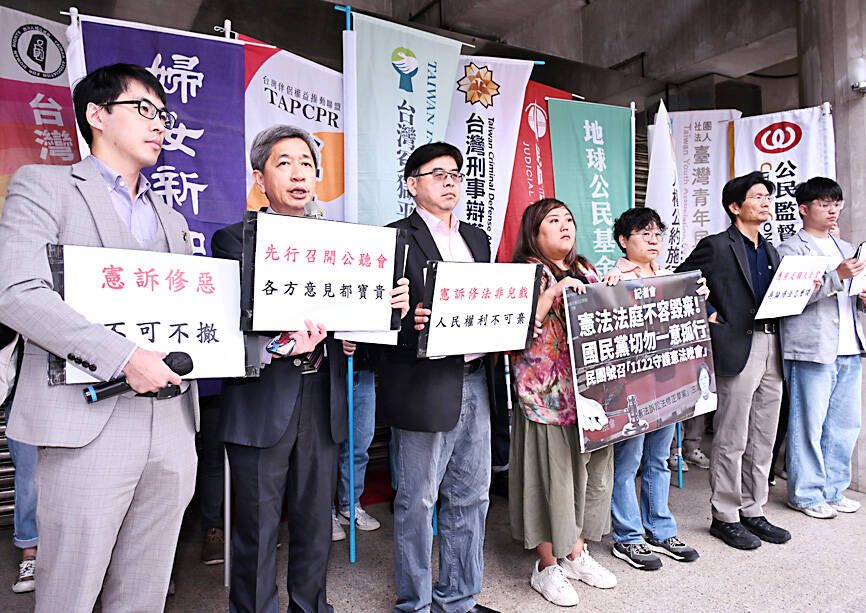Judicial Reform Foundation members and a group of civic organizations yesterday announced they would hold a rally on Friday demanding that the Chinese Nationalist Party (KMT) withdraw proposals to amend the Constitutional Court Procedure Act (憲法訴訟法).
KMT Legislator Weng Hsiao-ling (翁曉玲) has proposed specifying that the Constitutional Court must consist of 15 justices and that a two-thirds majority would be needed to issue a ruling.
The groups accused Weng and the KMT of using political ploys to destroy Taiwan’s constitutional democracy, abusing legislative authority to undermine the proper functioning of the judiciary and denying citizens their right to request a constitutional interpretation.

Photo: Fang Pin-chao, Taipei Times
They also said the proposal to raise the threshold was a major retrogression for the judicial reform movement and that paralyzing the Constitutional Court would create a constitutional crisis and lead to the dismantling of Taiwan’s democratic framework.
In a joint statement, the groups voiced five demands:
First, that Weng withdraw the bills immediately and apologize to the public.
Second, that TPP legislators oppose the amendments.
Third, legislators must not proceed with the amendment before ratifying the new nominees for Constitutional Court justices, as that would paralyze the Constitutional Court.
Fourth, the Legislative Yuan should listen to the opinions and suggestions of legal experts, civic society groups and all sectors of society regarding the amendments and the impact of such changes.
Lastly, legislators should take into account gender equality and the rights of workers, marginalized groups, indigenous peoples and the underprivileged.
Legislators, regardless of their political affiliations, must protect and maintain the functionality of the Constitutional Court, the groups said in the statement.
The event, titled “Defend the Constitution,” is to start on Friday evening outside the Legislative Yuan.

DEFENSE: The National Security Bureau promised to expand communication and intelligence cooperation with global partners and enhance its strategic analytical skills China has not only increased military exercises and “gray zone” tactics against Taiwan this year, but also continues to recruit military personnel for espionage, the National Security Bureau (NSB) said yesterday in a report to the Legislative Yuan. The bureau submitted the report ahead of NSB Director-General Tsai Ming-yen’s (蔡明彥) appearance before the Foreign and National Defense Committee today. Last year, the Chinese People’s Liberation Army (PLA) conducted “Joint Sword-2024A and B” military exercises targeting Taiwan and carried out 40 combat readiness patrols, the bureau said. In addition, Chinese military aircraft entered Taiwan’s airspace 3,070 times last year, up about

The Overseas Community Affairs Council (OCAC) yesterday announced a fundraising campaign to support survivors of the magnitude 7.7 earthquake that struck Myanmar on March 28, with two prayer events scheduled in Taipei and Taichung later this week. “While initial rescue operations have concluded [in Myanmar], many survivors are now facing increasingly difficult living conditions,” OCAC Minister Hsu Chia-ching (徐佳青) told a news conference in Taipei. The fundraising campaign, which runs through May 31, is focused on supporting the reconstruction of damaged overseas compatriot schools, assisting students from Myanmar in Taiwan, and providing essential items, such as drinking water, food and medical supplies,

A magnitude 4.3 earthquake struck eastern Taiwan's Hualien County at 8:31am today, according to the Central Weather Administration (CWA). The epicenter of the temblor was located in Hualien County, about 70.3 kilometers south southwest of Hualien County Hall, at a depth of 23.2km, according to the administration. There were no immediate reports of damage resulting from the quake. The earthquake's intensity, which gauges the actual effect of a temblor, was highest in Taitung County, where it measured 3 on Taiwan's 7-tier intensity scale. The quake also measured an intensity of 2 in Hualien and Nantou counties, the CWA said.

STRICTER ENFORCEMENT: Taipei authorities warned against drunk cycling after a sharp rise in riding under the influence, urging greater public awareness of its illegality Taipei authorities have issued a public warning urging people not to ride bicycles after consuming alcohol, following a sharp rise in riding under the influence (DUI) cases involving bicycles. Five hundred and seven people were charged with DUI last year while riding YouBikes, personal bicycles, or other self-propelled two-wheelers — a fourfold increase from the previous year, data released by the Taipei Police Department’s Traffic Division showed. Of these, 33 cases were considered severe enough to be prosecuted under “offenses against public safety,” the data showed. Under the Road Traffic Management and Penalty Act (道路交通管理處罰條例), bicycles — including YouBikes and other